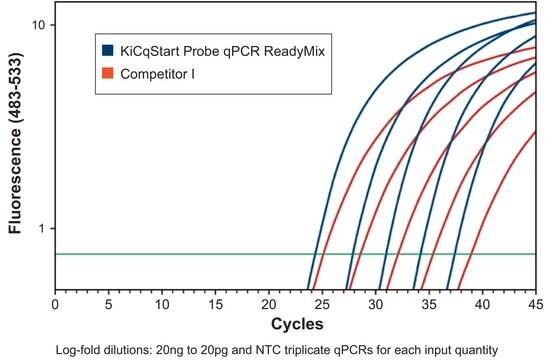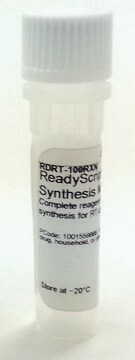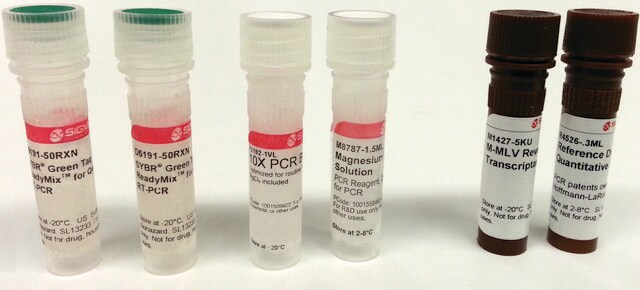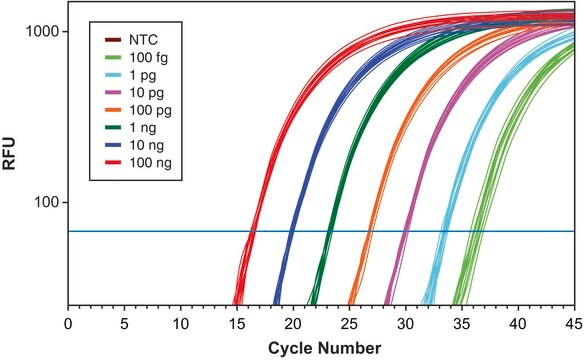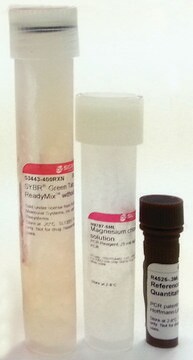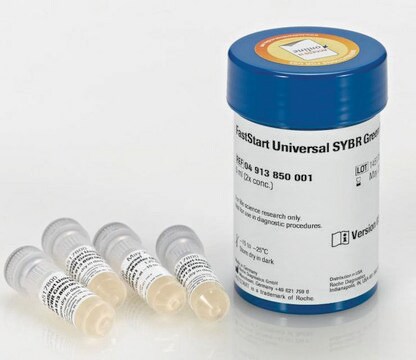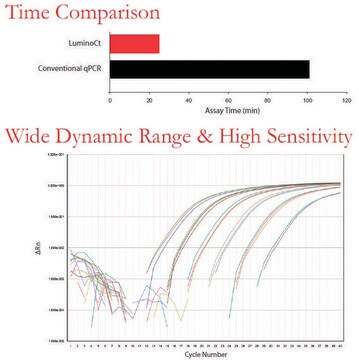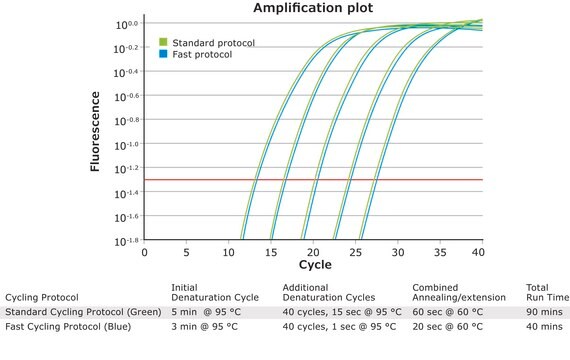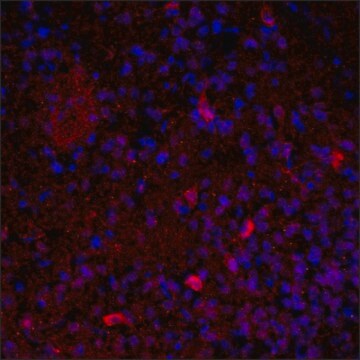KCQS01
KiCqStart® SYBR® Green qPCR ReadyMix™
Low ROX™, for ABI and Stratagene instruments
Synonym(s):
qPCR master mix, sybr green qPCR
About This Item
form
liquid
usage
sufficient for 1250 reactions
sufficient for 250 reactions
sufficient for 5000 reactions
feature
dNTPs included
hotstart
storage condition
protect from light
technique(s)
qPCR: suitable
color
colorless
input
purified DNA
compatibility
for use with ABI 7500 Fast
for use with ABI 7500
for use with ABI ViiA 7
for use with Agilent AriaMx
for use with Douglas Scientific IntelliQube
for use with Qiagen Rotor-Gene Q
for use with QuantStudio™
for use with Strategene Mx3000P
for use with Strategene Mx3005P
for use with Strategene Mx4000
detection method
SYBR® Green
shipped in
dry ice
storage temp.
−20°C
Looking for similar products? Visit Product Comparison Guide
General description
Highly specific amplification is crucial to successful qPCR with SYBR Green I dye technology because this dye binds to and detects any dsDNA generated during amplification. Hot-Start Taq DNA polymerase is antibody mediated to be inactive prior to the initial PCR denaturation step.
Application
- for the amplification and quantification of DNA in real-time PCR (qPCR) assay
- in the amplification and quantification of transcripts in 2-step quantitative reverse transcription polymerase chain reaction (qRT-PCR)
- in the amplification of complementary DNA (cDNA) by real-time PCR (qPCR) assay
- Gene expression
- DNA quantification
- CHiP
Features and Benefits
- Assay results in as little as 33 minutes
- Highly efficient and sensitive real-time PCR results
- Little/no optimization required
Components
packaging:
250 reactions* = 2 X 1.25 mL tubes
1250 reactions* = 10 X 1.25 mL tubes
5000 reactions* = 1 X 50 mL tube
*number of reactions based on a 20uL volume
Quality
Other Notes
KiCqStart SYBR Green qPCR ReadyMix is stable for 1 year when stored in a constant temperature freezer at -20°C, protected from light. For convenience, it may be stored unfrozen at +2 to +8°C for up to 6 months. After thawing, mix thoroughly before using. Repeated freezing and thawing of the product is not recommended. However, the product demonstrated no loss of performance after 20 freeze-thaw cycles or 2 months at +20°C.
Legal Information
recommended
related product
Storage Class Code
12 - Non Combustible Liquids
WGK
WGK 3
Flash Point(F)
Not applicable
Flash Point(C)
Not applicable
Certificates of Analysis (COA)
Search for Certificates of Analysis (COA) by entering the products Lot/Batch Number. Lot and Batch Numbers can be found on a product’s label following the words ‘Lot’ or ‘Batch’.
Already Own This Product?
Find documentation for the products that you have recently purchased in the Document Library.
Customers Also Viewed
Articles
After a traditional PCR has been completed, the PCR/qPCR data analysis is conducted by resolution through an agarose gel or, more recently, through a capillary.
PCR assay guide navigates you through primer validation and other assay optimization factors to ensure high sensitivity and specificity for optimum DNA/ RNA quantification.
Real-time polymerase chain reaction allows researchers to estimate the quantity of starting material in a sample. It has a much wider dynamic range of analysis than conventional PCR
Ago RIP to Isolate microRNA and their Targets Using Imprint® RNA Immunoprecipitation Kit
Protocols
Quantitative PCR protocol using SYBR Green reagents. Procedure supports most qPCR instruments.
Once an assay has been optimized, it is important to verify the reaction efficiency. This information is important when reporting and comparing assays. In this example protocol, the assay efficiency is compared over a wide and narrow dynamic range of cDNA concentrations.
A protocol that can be used as a basic template for qPCR incorporating SYBR Green I DNA binding dye that is amenable to modification and applicable for use as validation for a set of primers.
Measuring a target quantity relative to one or more stable reference genes using SYBR Green I dye detection is a common application of qPCR. Below is a standard protocol that can be adapted to specific experimental needs.
Our team of scientists has experience in all areas of research including Life Science, Material Science, Chemical Synthesis, Chromatography, Analytical and many others.
Contact Technical Service